President Donald Trump arrived in Saudi Arabia on Tuesday for his first major overseas trip since retaking office, hoping to secure major deals on trade and diplomatic breakthroughs across the Middle East.
The president might have an unexpected and willing partner in Syria’s new president who could offer him a huge diplomatic win.
"This is a historic opportunity, and it would be a shame if the U.S. lost it," Natasha Hall, senior fellow with the Middle East Program at the Center for Strategic and International Studies (CSIS), told Fox News Digital.
President Trump seems open to renewed relations with Syria, including the possibility of lifting crippling sanctions imposed under the previous regime of Bashar al-Assad.
ISLAMIST GROUP RUNNING SYRIA HAS MIXED RECORD OVER GOVERNANCE IN PROVINCE, RULED WITH 'IRON FIST'
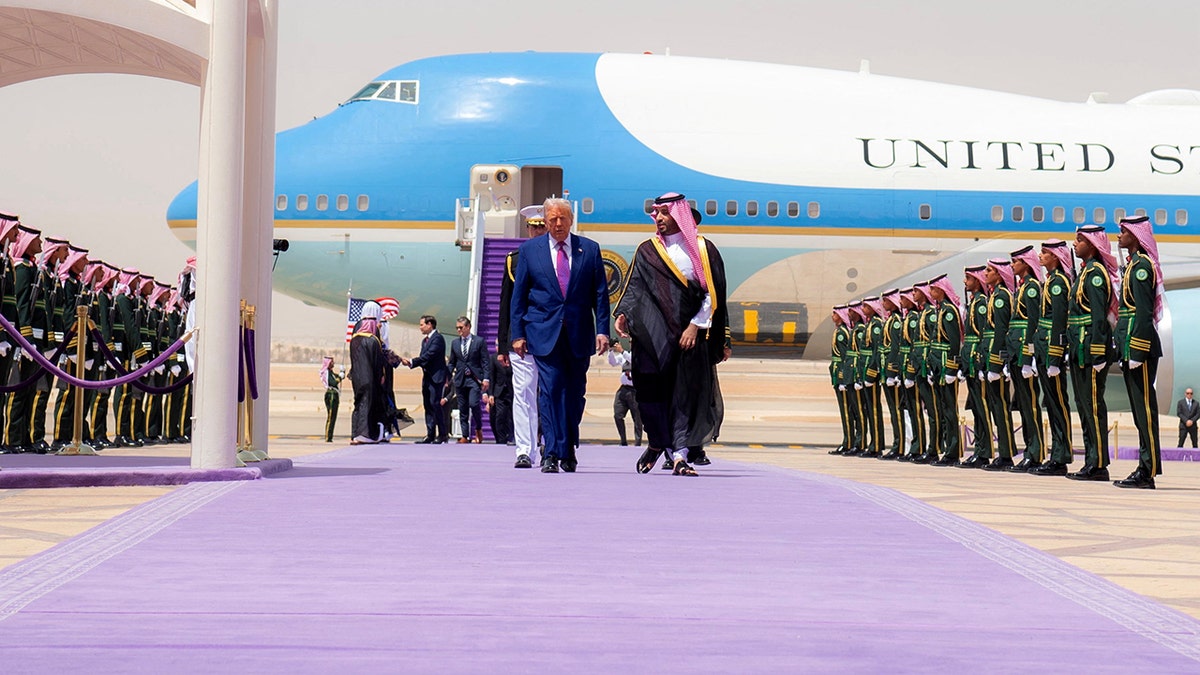
President Donald Trump, left, walks with Saudi Crown Prince Mohammed bin Salman during a welcoming ceremony in Riyadh, Saudi Arabia, on May 13, 2025. (Bandar Algaloud/Courtesy of Saudi Royal Court/Handout via REUTERS)
"We may take them off of Syria, because we want to give them a fresh start," President Trump told reporters in the Oval Office on Monday.
The president added that "we want to see if we can help them out" and that a determination on Syria sanctions will be made at some point.
"Syria now, for the first time, has a government in power that is not only no longer reliant on Iran to survive but is quite hostile to Iran, and so that would be a big opportunity lost if the U.S. didn’t step up," Hall added.
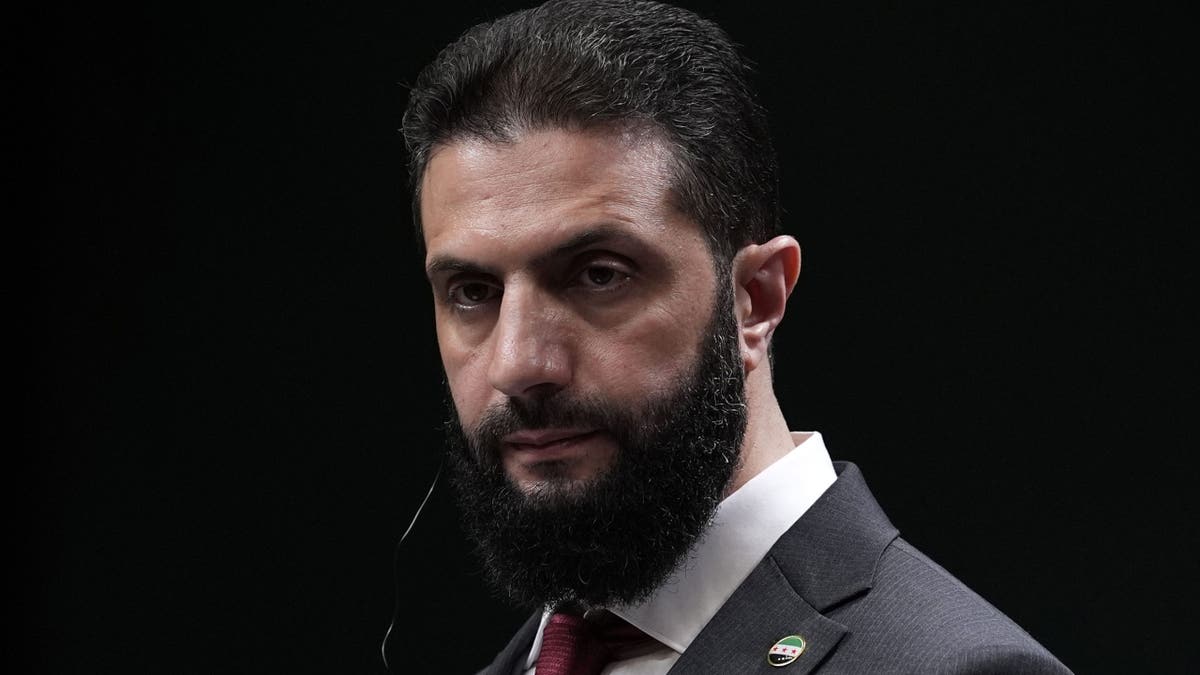
Turkish President Recep Tayyip Erdogan and Syrian interim President Ahmad Al-Sharaa, pictured here, hold a press conference after their meeting at the Presidential Complex in Ankara, Turkiye, on Feb. 4, 2025. (Mehmet Ali Ozcan/Anadolu via Getty Images)
Mouaz Moustafa, executive director of the Syrian Emergency Task Force, a non-profit helping to bring democracy to Syria, recently met with Syria's interim President Ahmad al-Sharaa in Damascus.
Moustafa exclusively told Fox News Digital that the two spoke for over three hours about a potential breakthrough in U.S.-Syrian relations, which have been severed since 2011 following the outbreak of the Syrian civil war, which led to the deaths of over 500,000 people.
Moustafa and others are pushing for a meeting between al-Sharaa and President Trump during his visit to the Gulf this week. For Syria’s new government, this will be their opportunity to persuade the new administration to do business with a country coming out of a devastating 14-year civil war and mend ties with a leader who was once aligned with the Islamic State and al Qaeda.
"Syria’s objectives are quite clear on why they would want to meet President Trump in Saudi Arabia, to make headway on some of these core issues of cooperation and to alleviate any of the concerns the White House may have. And some of the things they’ve been trying to do is to show that they can be cooperative on intelligence issues, on business, and talking about companies seeking to do business in Syria," CSIS’ Hall said.
SYRIA'S NEW REGIME HITS HEZBOLLAH TARGETS IN LEBANON OVER CLAIMS ITS FIGHTERS WERE EXECUTED
Yet others urge caution. "Right now, Sharaa is not restricting political and civil liberties, but he's an authoritarian by nature." former U.S. Ambassador to Syria Robert Ford told Fox News Digital.
Ford, who was the last U.S. ambassador in Damascus, was pulled from the embassy in October 2011 after the Syrian uprising turned violent. Ford led the effort to put al-Sharaa on the terrorist list in 2012 and said, although he is pragmatic, he is leading an extremely weak government.
"He doesn’t control all of Syria yet. The government in Damascus that he leads is not very strong, and it will take time to reassert all of its authority over Syria," Ford said.
Ford does not believe al-Sharaa will pursue terrorism as he did in the past, but while there have been some promising developments since taking power, the U.S. must keep its expectations relatively low.
"Syria is so weak, militarily and economically, with lots of internal political divisions. Therefore, it's not going to be in a position to sign huge arrangements with the U.S.," Ford cautioned.
A senior official in the Syrian Foreign Ministry told Fox News Digital that President al-Sharaa emphasizes "that the new Free Syria seeks to establish a strong strategic relationship with the United States, one grounded in mutual interests and shared partnership."

People wave guns in the air as they gather to celebrate the fall of the Syrian regime in Umayyad Square on Dec. 8 in Damascus, Syria. (Ali Haj Suleiman/Getty Images)
The senior official added that "Damascus sees U.S. President Donald Trump as the leader most capable of achieving peace in the Middle East," noting that Syria hopes to become an active and influential ally to Washington on regional issues.
Moustafa also met with members of the National Security Council and conveyed the Syrian president's desire for a new partnership.
The National Security Council did not immediately respond to a Fox News Digital request for comment.
The new Syrian leader has already shown a willingness to cooperate on some key issues important to the U.S. The new Syrian government has cooperated with U.S. intelligence agencies and foiled several ISIS plots to attack Damascus. Syrian intelligence services also arrested ISIS commander Abu al-Harith al-Iraqi in February.
TRUMP TARGETS MASSIVE INVESTMENTS IN FIRST MIDDLE EAST TRIP
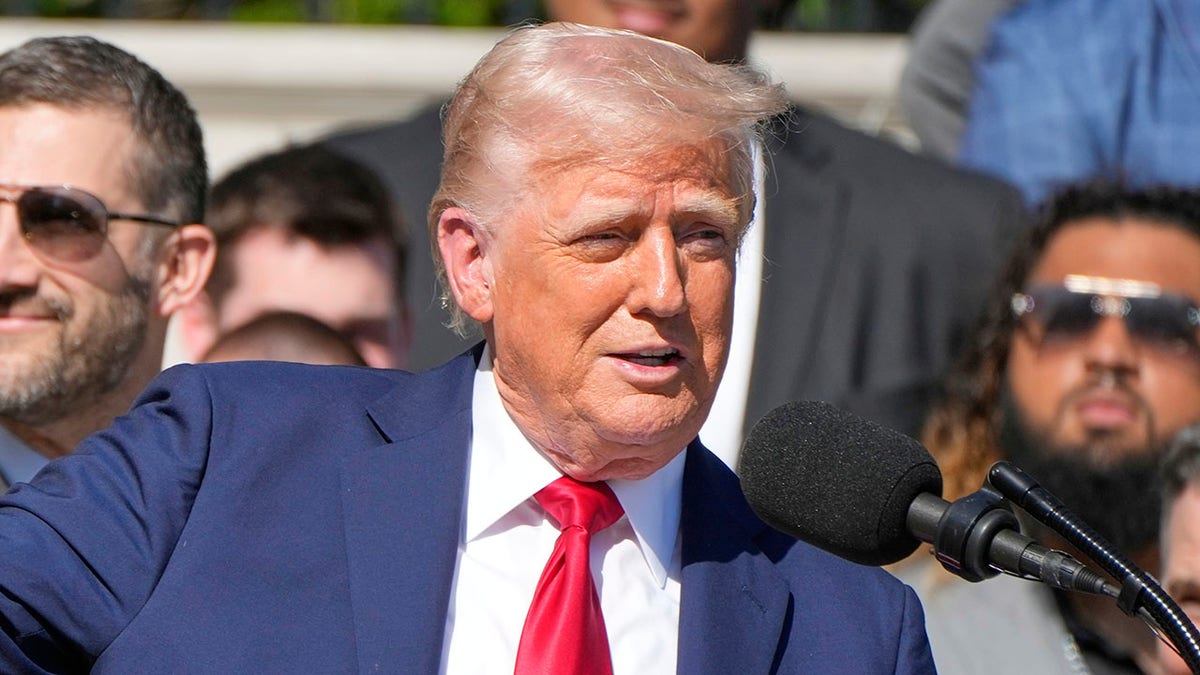
President Donald Trump speaks as he welcomes the Super Bowl champion Philadelphia Eagles NFL football team to the South Lawn of the White House on Monday, April 28, 2025, in Washington. (AP Photo/Mark Schiefelbein)
Moustafa also said that al-Sharaa was worried about the massive buildup of Iranian-backed militias along the Iraqi side of the Syrian border. This is a worry for the U.S. as well as the Trump administration, he said, as it has been looking to reengage with Iran to curb its nuclear program.
In al-Sharaa’s eyes, the deal of the century would bring peace to Syria and its neighbors, including Israel. Moustafa added the deal would keep China, Russia and Iran out and allow U.S. troops to go home in the right way.
Yet critics warn a potential deal with the United States is not without its obstacles.
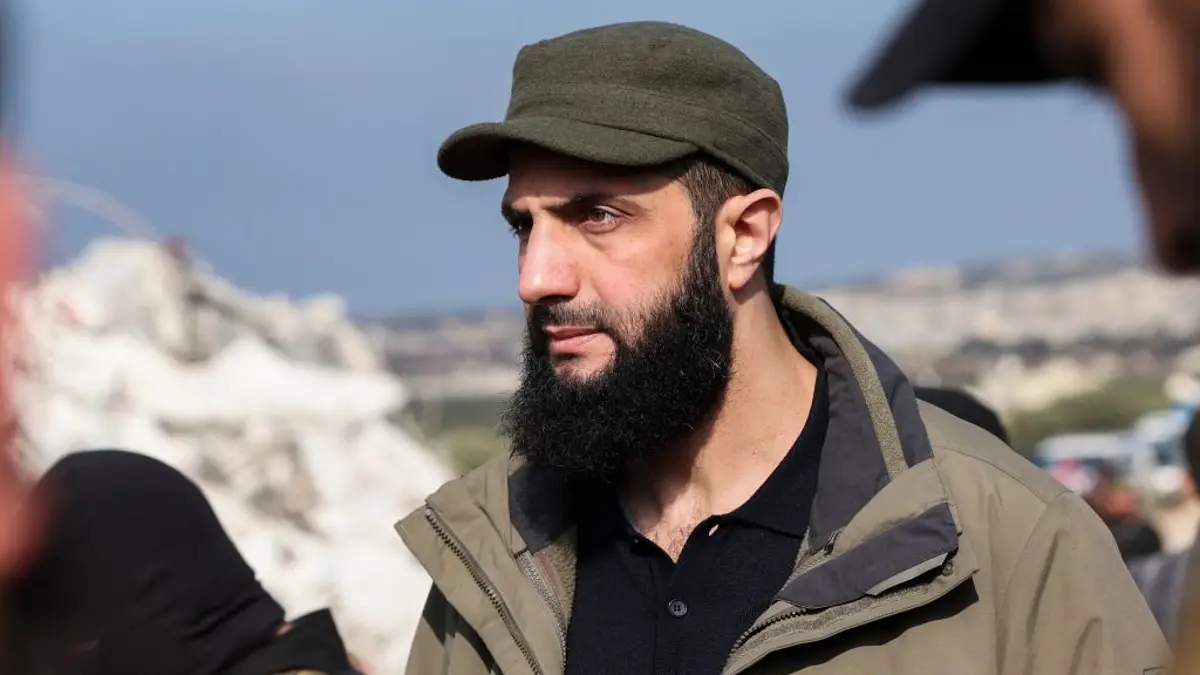
Hayat Tahrir al-Sham, then jihadist group's chief Abu Mohamed al-Jolani, checks the damage following an earthquake in the village of Besnaya in Syria's rebel-held northwestern Idlib province at the border with Turkey, on February 7, 2023. Since becoming the country's leader, Jolani is now known as Ahmad al-Sharaa. (OMAR HAJ KADOUR/AFP via Getty Images)
Al-Sharaa led the Islamist rebel group Hay’at Tahrir al-Sham (HTS) to victory over the Assad dictatorship in December. He had a $10 million bounty for his capture that was lifted in February amidst the administration’s efforts to talk to the new Syrian government.
CHRISTIAN WATCH GROUP RISES UP TO PROTECT COMMUNITY AMID GROWING VIOLENCE IN SYRIA
HTS is still a designated foreign terrorist organization, which complicates doing business in Syria.
"The question at hand is whether to believe that a change in behavior, following the fall of the regime, translates into a more permanent change in character, ideology, and governance," Caroline Rose, director of The New Lines Institute, told Fox News Digital.
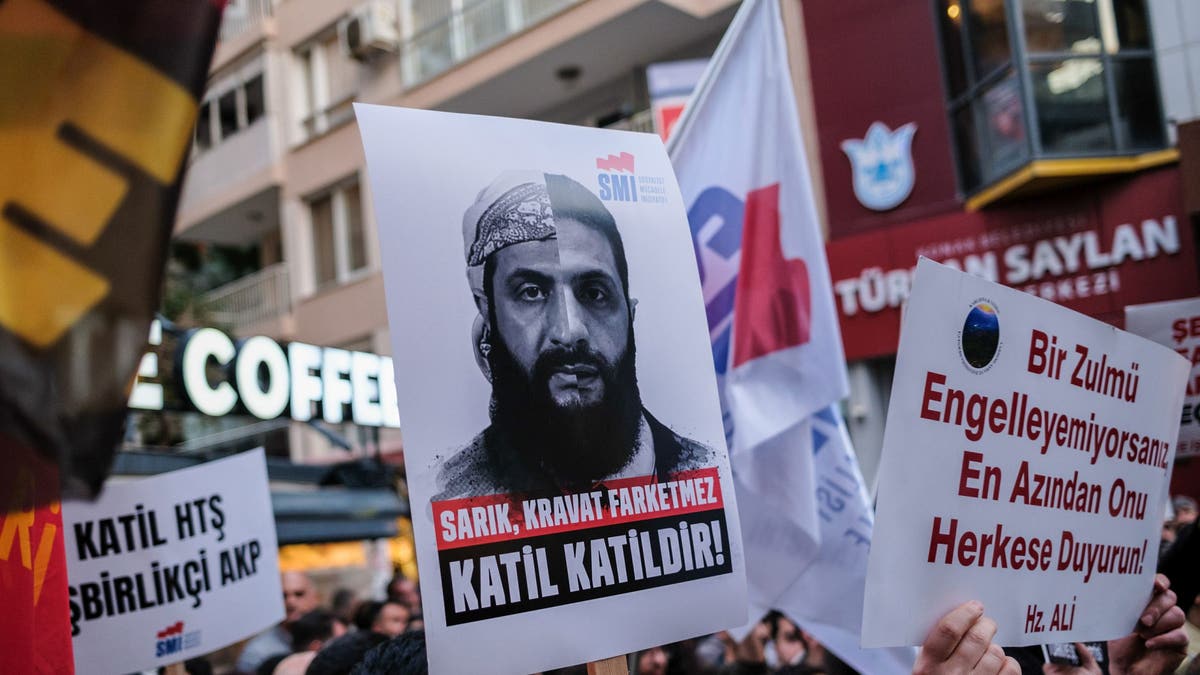
A protester holds a placard with a photo of Ahmed al-Shara (Colani) and the words "It doesn't matter if he wears a turban or a tie, a murderer is a murderer" during the demonstration. (Murat Kocabas/SOPA Images/LightRocket via Getty Images)
Rose, who recently traveled to Syria, noted that while HTS has been incrementally breaking away from affiliations with terrorist organizations and has adopted some moderate elements over time, there are still doubts that this will "stick," particularly with recent sectarian tensions.
"Skeptics of lifting restrictions on Syria immediately fear that any move could be too premature and could risk the U.S.’ credibility among its regional counterparts," Rose added.
Since becoming president, al-Sharaa has formed a transitional government composed of close allies from the HTS rebel group and a mix of technocrats, former opposition leaders, civil society activists and even some former members of the Assad government.
The temporary constitution signed by al-Sharaa in March guarantees basic freedoms such as freedoms of opinion, expression and the press. It also protects women’s rights and promises equal rights for all Syrians regardless of ethnicity, religious sect or gender, yet it still leaves the country under Islamist rule during the transitional process.
There remain some concerns over the power concentrated in the hands of the president. The president can unilaterally declare a state of emergency and suspend basic rights if national security is threatened.
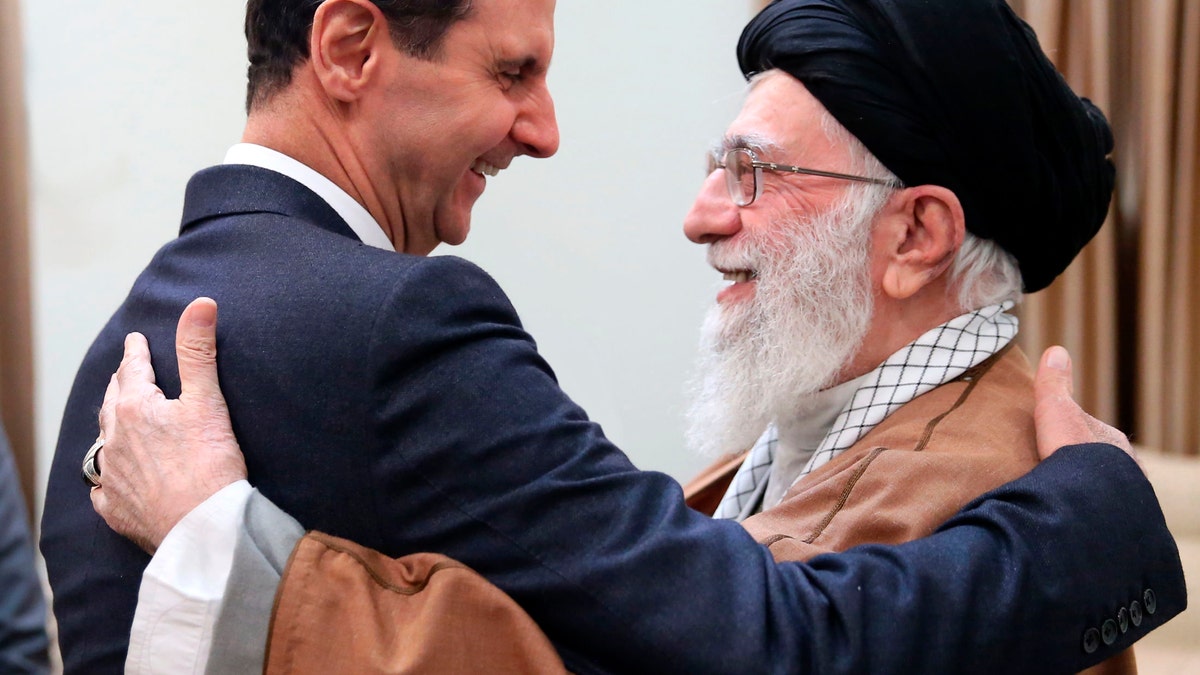
Supreme Leader Ayatollah Ali Khamenei, right, greets the then-Syrian President Bashar Assad in Tehran, Iran, on Feb. 25, 2019. (Office of the Iranian Supreme Leader via AP, File)
The vast powers granted to the executive in the new constitution is a reminder for many Syrians of the authoritarian past many suffered at the hands of the Assad regime for over 50 years.
Although there is a new sense of optimism within Syrian society about its future, civil peace and security remain elusive.
Deadly sectarian clashes in March launched by remnants of the former Assad regime in Syria’s coastal region led to the deaths of 200 members of the security forces. Forces allied with the government and armed civilians responded with brute force. The Syrian Network for Human Rights reported that these groups were responsible for the deaths of at least 396 people.
CLICK HERE TO GET THE FOX NEWS APP
Tensions have also escalated with Syria’s Druze population as well, highlighting the delicate balance of Syria’s complex ethnic divides and the new authority’s ability to control various armed factions.
The Associated Press contributed to this report.
.png)
 German (DE)
German (DE)  English (US)
English (US)  Spanish (ES)
Spanish (ES)  French (FR)
French (FR)  Hindi (IN)
Hindi (IN)  Italian (IT)
Italian (IT)  Russian (RU)
Russian (RU)  6 hours ago
2
6 hours ago
2
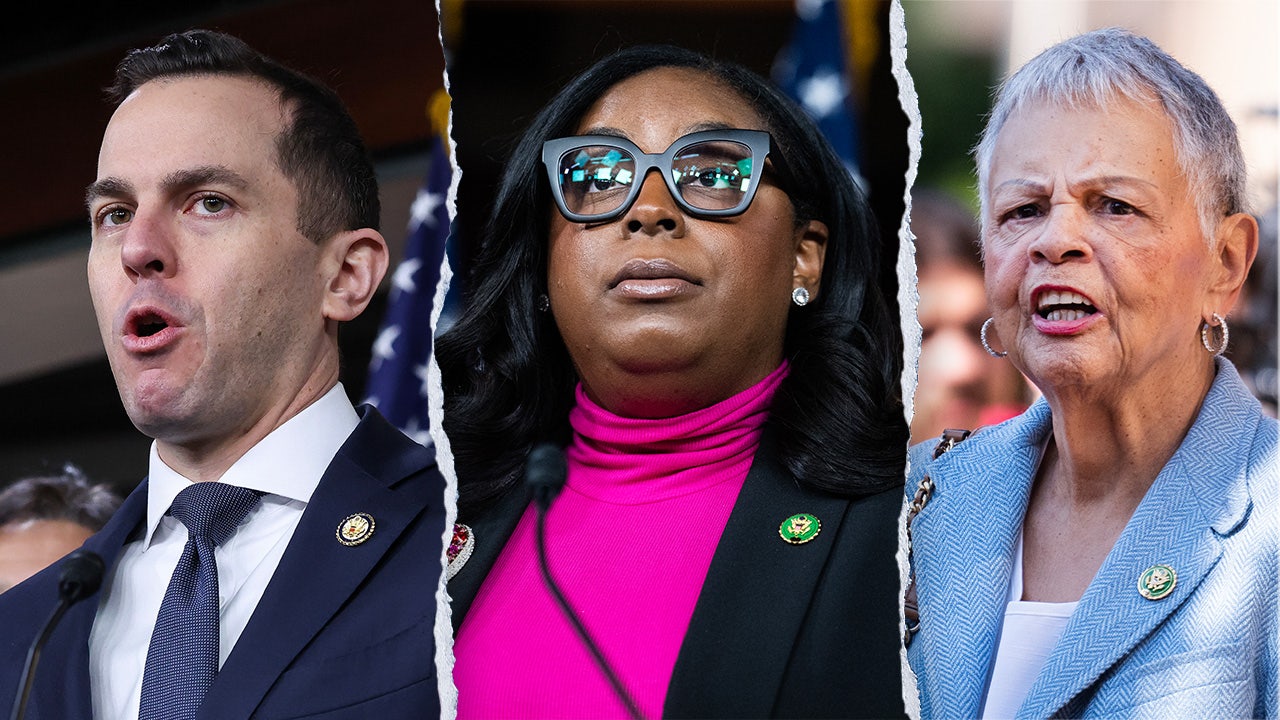





Comments